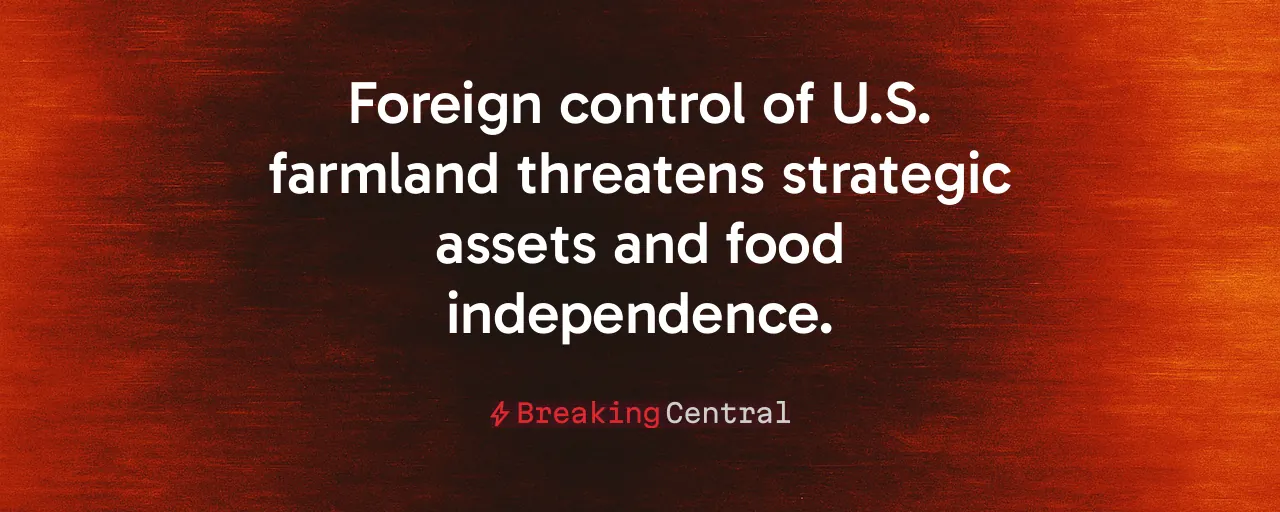A Wake-Up Call on Foreign Ownership
A recent announcement revealed that the Trump administration is launching an initiative to reclaim U.S. farmland owned by individuals or entities linked to the Chinese Communist Party. The initiative, now confirmed, targets a growing concern: foreign control over America's agricultural backbone. The focus extends beyond crops or cattle, encompassing who holds the keys to the nation's food security and strategic assets. This move signals a broader effort to prioritize American interests in a world where global influence often comes at a steep cost.
The plan involves new laws, rigorous security reviews, and, if needed, forced sales of land. The core objective is ensuring the United States remains self-sufficient and safe from external leverage. The stakes are high, involving farmland near military bases, critical supply chains, and the ability to feed the nation without relying on adversaries. This represents a defining moment for national priorities.
Why the Alarm Bells Are Ringing
Entities linked to the Chinese Communist Party control an estimated 350,000 to 400,000 acres of U.S. farmland, according to federal data. That includes parcels uncomfortably close to places like Grand Forks Air Force Base in North Dakota and Laughlin Air Force Base in Texas. The 2013 acquisition of Smithfield Foods by WH Group, a Chinese firm, brought over 100,000 more acres under foreign corporate control, creating potential vulnerabilities.
Security experts point to real risks. Chinese laws require firms to cooperate with Beijing's intelligence operations. Land near military installations could become listening posts or worse. The food supply also presents a concern. In a crisis, foreign control over key agricultural assets could disrupt markets or choke off access. Recent trespassing incidents by Chinese nationals at sensitive U.S. sites only sharpen these concerns, underscoring the need for decisive action.
Learning From the Past
Worries about foreign land ownership aren't new. Back in 1978, Congress passed the Agricultural Foreign Investment Disclosure Act after Middle Eastern investors started buying up U.S. farmland. States like Iowa took it further, banning foreign purchases outright in the 1980s. The issue resurfaced with China's rise, especially after the Smithfield deal in 2013. By 2022, states were passing their own restrictions, and Congress began debating federal limits on nations like China, Iran, and Russia.
The current initiative differs in scope. This marks the first federal push to restrict future sales and force divestitures of existing holdings. This approach recognizes that past oversight left gaps, such as shell companies dodging reporting rules. History shows that waiting too long risks losing control of critical resources. The Trump administration's approach builds on decades of concern, aiming to close those gaps with precision.
A Plan Rooted in American Strength
The administration's strategy is multifaceted. It starts with a proposed ban on future farmland purchases by China and other nations deemed threats. Existing holdings face mandatory reviews by the Committee on Foreign Investment in the United States, with a focus on land near military sites. If risks are confirmed, owners could be forced to sell within five years. To sweeten the deal, grants and tax credits would help American veterans and family farmers buy the land, keeping it in trusted hands.
Beyond security, the plan champions economic opportunity. American farmers, often squeezed by rising costs and corporate consolidation, could gain access to prime acreage. It's a chance to strengthen rural communities and ensure the nation's agricultural heartland stays under domestic control. The policy also calls for tougher penalties on schemes using straw buyers to skirt rules, signaling zero tolerance for loopholes.
Navigating the Challenges
No plan is without hurdles. Forcing sales could spark legal battles, especially if owners claim violations of property rights or discriminatory treatment. The Fourteenth Amendment and international trade agreements add complexity, as do potential lawsuits over compensation for seized land. The economic angle also presents challenges: divested land might temporarily depress prices, but higher transaction costs could ripple through markets. Rural communities, while eager for local ownership, worry about job losses if Chinese-owned facilities shut down.
Tracking true ownership through layers of shell companies takes time and resources. Federal and state agencies need to work in lockstep, and there should be enough domestic buyers ready to step in. Despite these challenges, the core argument holds: national security and food independence outweigh short-term disruptions. The key is execution that is both firm and fair.
A Broader Vision for the Future
This initiative extends beyond farmland, encompassing the broader goal of reclaiming control over America's destiny. It serves as a reminder that sovereignty starts with the land under our feet. By prioritizing security and self-reliance, the policy sets a precedent for how to handle other critical sectors, from energy to technology. It also sends a message to allies and adversaries alike: the United States will protect its interests without apology.
There is room for balance. Bipartisan ideas, such as better tracking of all foreign land deals or targeted reviews near military zones, could strengthen the effort without alienating partners. The goal is resilience, ensuring America can stand strong in an uncertain world. Farmers, veterans, and rural communities stand to gain, but only if the policy is implemented with clarity and resolve.
As the nation watches this unfold, one thing is clear: the fight for America's farmland is a fight for its future. It represents a bold step toward a stronger, more secure country, rooted in the values of independence and opportunity. The road ahead will not be easy, but the prize, a nation that controls its own fate from the ground up, makes it worthwhile.
